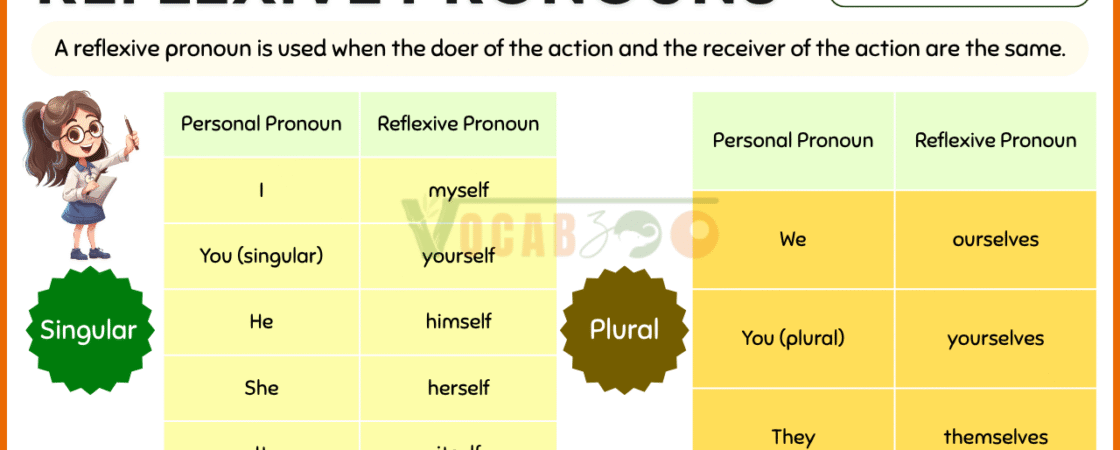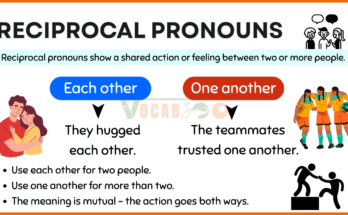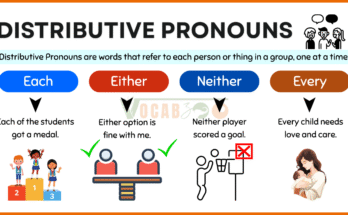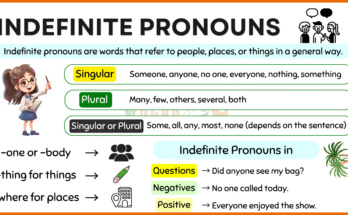Understanding English grammar becomes easier when you learn reflexive pronouns. These are special pronouns used when the subject and object in a sentence are the same person. Let’s learn everything step by step in simple English!
You may also need to learn more Types of Pronouns in English with their easy examples.
What is a Reflexive Pronoun?
A reflexive pronoun is used when the doer of the action and the receiver of the action are the same.
Definition:
A Reflexive Pronoun refers back to the subject of the sentence.
It shows that the action is being done to the person or thing itself.

Singular Reflexive Pronouns
| Personal Pronoun | Reflexive Pronoun |
|---|---|
| I | myself |
| You (singular) | yourself |
| He | himself |
| She | herself |
| It | itself |
Plural Reflexive Pronouns
| Personal Pronoun | Reflexive Pronoun |
|---|---|
| We | ourselves |
| You (plural) | yourselves |
| They | themselves |
How to Identify Reflexive Pronouns?
Reflexive pronouns usually end in:
- -self (singular)
- -selves (plural)
You can identify a reflexive pronoun when:
- The subject and object are the same
- It answers “to whom?” or “to what?” after the verb
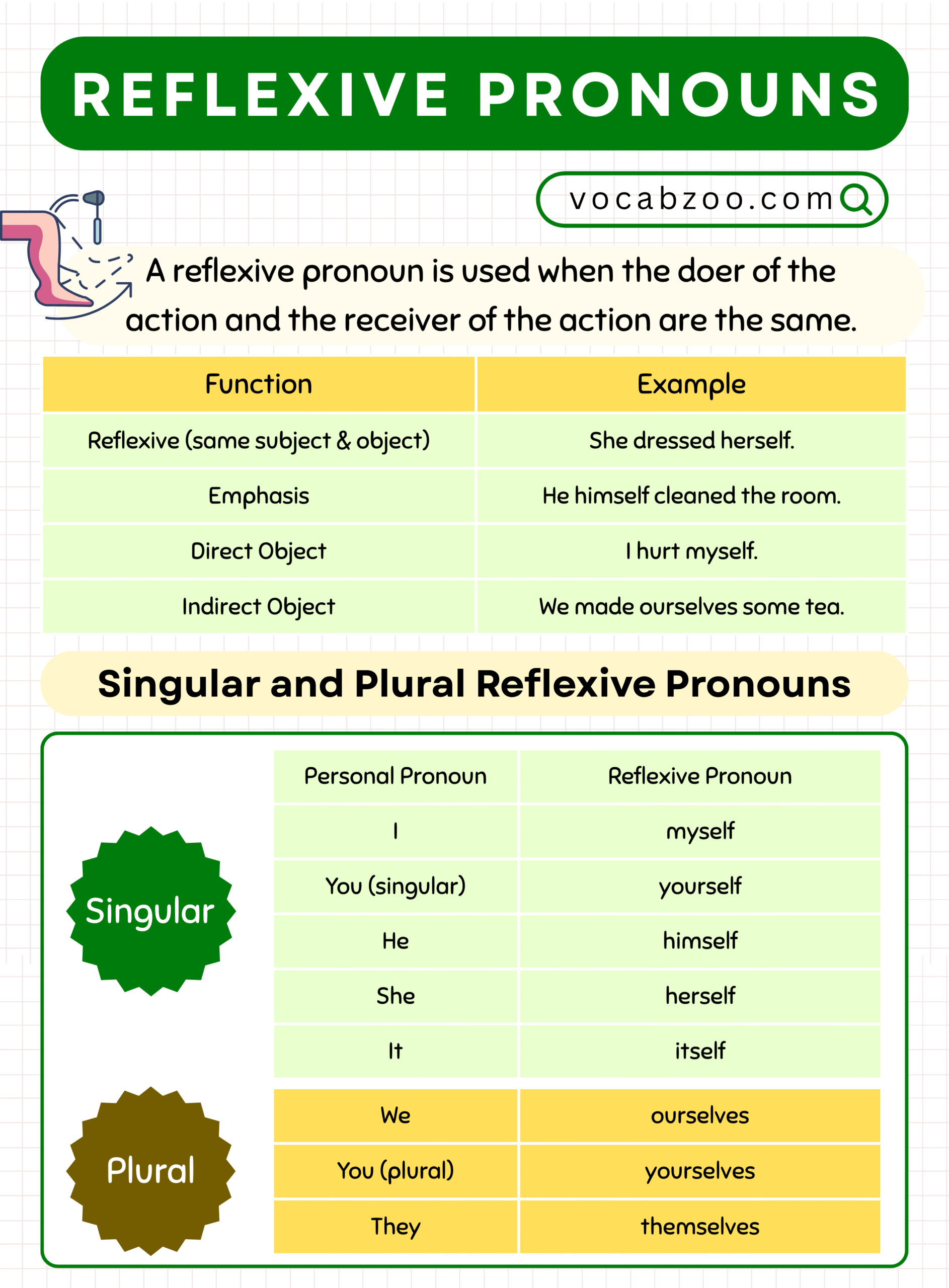
How to Match Reflexive and Personal Pronouns?
Here’s how you match personal pronouns with their reflexive pronouns:
| Personal Pronoun | Reflexive Pronoun |
|---|---|
| I | myself |
| You (singular) | yourself |
| He | himself |
| She | herself |
| It | itself |
| We | ourselves |
| You (plural) | yourselves |
| They | themselves |
When to Use Reflexive Pronouns
Use reflexive pronouns when:
1. The subject and object are the same
- I cut myself while cooking.
- She looked at herself in the mirror.
2. To emphasize the subject
- He himself fixed the car.
- We cleaned the room ourselves.
Reflexive Pronouns as Direct Objects
A direct object receives the action directly.
Examples:
- She blamed herself for the mistake.
- I taught myself to play guitar.
- They introduced themselves at the party.
Reflexive Pronouns as Indirect Objects
An indirect object is the person or thing that receives the benefit of the action.
Examples:
- He poured himself a glass of water.
- I bought myself a new notebook.
- She made herself a sandwich.
Example Sentences with Reflexive Pronouns
Sentences with Singular Reflexive Pronouns
| Reflexive Pronoun | Example Sentence |
|---|---|
| myself | I made myself a sandwich. |
| yourself | You should take care of yourself. |
| himself | He cut himself while shaving. |
| herself | She taught herself to paint. |
| itself | The cat cleaned itself. |
| Reflexive Pronoun | Example Sentence |
|---|---|
| ourselves | We enjoyed ourselves at the party. |
| yourselves | You should be proud of yourselves. |
| themselves | They introduced themselves to the teacher. |
Reflexive Pronouns for Emphasis
- I will do it myself.
- She herself cleaned the entire house.
- We fixed the car ourselves.
Mini Quiz – Choose the Correct Reflexive Pronoun
- I hurt ______ while playing.
- They enjoyed ______ at the picnic.
- She told ______ to stay calm.
- We taught ______ how to swim.
- You must respect ______.
Answers:
- myself
- themselves
- herself
- ourselves
- yourself (or yourselves for plural)
FAQs – Reflexive Pronouns
Q1: Can reflexive pronouns be used to show emphasis?
Yes. Example: I myself don’t believe it.
Q2: What’s the difference between “yourself” and “yourselves”?
- Yourself is for one person
- Yourselves is for more than one person
Example: You should behave yourself. / You all should behave yourselves.
Q3: Is “each other” a reflexive pronoun?
No. “Each other” is a reciprocal pronoun, not a reflexive one.
Summary—Reflexive Pronouns
| Function | Example |
|---|---|
| Reflexive (same subject & object) | She dressed herself. |
| Emphasis | He himself cleaned the room. |
| Direct Object | I hurt myself. |
| Indirect Object | We made ourselves some tea. |
Use reflexive pronouns when you are doing something to yourself or to your own group. They make your English more accurate and clearer.
Read More
